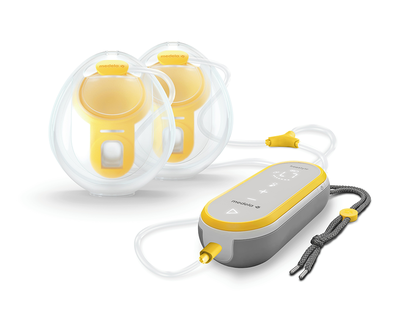
Hands-free Electric
Hands-free breast pumps feature in-bra collection cups for multi-tasking and an internal rechargeable battery, so you don’t have to be plugged into a wall while using. Choose from single or double cups.

Classic Electric
Our electric breast pumps feature 2-Phase Expression technology, which mimics babies’ natural sucking rhythms, allowing mums to express more breast milk in less time.

Manual
Single manual breast pumps are perfect for mums who express occasionally and need a lightweight travel companion.

Symphony - No 1 Hospital Pump
Medela Symphony® is a reliable, multi-user breast pump for hospitals and home rental, ideal for long-term and frequent pumping.


Sign-up to Newsletter
Welcome to the Medela Family Newsletter, your gateway to the vibrant world of breastfeeding. Join our community to explore breastfeeding resources, receive invaluable support, access exclusive promotions, and expand your knowledge on breastfeeding and early parenting.

Medela Family App
The Medela Family app by Medela helps you track your baby’s key activities, provides expert tips and helps you get the right products for your breastfeeding needs.

Rent a Breast Pump

Contact us
Reach out to the Medela team for personalized support, inquiries, or feedback. Whether you have questions about our products, need assistance with breastfeeding, or want to share your experience, we're here to help.

Community Support
Medela is committed to supporting the wider community through local and national projects and initiatives.

Distributor

Sign-up to Newsletter
Welcome to the Medela Family Newsletter, your gateway to the vibrant world of breastfeeding. Join our community to explore breastfeeding resources, receive invaluable support, access exclusive promotions, and expand your knowledge on breastfeeding and early parenting.

Medela Family App
The Medela Family app by Medela helps you track your baby’s key activities, provides expert tips and helps you get the right products for your breastfeeding needs.

Rent a Breast Pump

Contact us
Reach out to the Medela team for personalized support, inquiries, or feedback. Whether you have questions about our products, need assistance with breastfeeding, or want to share your experience, we're here to help.

Community Support
Medela is committed to supporting the wider community through local and national projects and initiatives.

Distributor

Hands-free Electric
Hands-free breast pumps feature in-bra collection cups for multi-tasking and an internal rechargeable battery, so you don’t have to be plugged into a wall while using. Choose from single or double cups.

Classic Electric
Our electric breast pumps feature 2-Phase Expression technology, which mimics babies’ natural sucking rhythms, allowing mums to express more breast milk in less time.

Manual
Single manual breast pumps are perfect for mums who express occasionally and need a lightweight travel companion.

Symphony - No 1 Hospital Pump
Medela Symphony® is a reliable, multi-user breast pump for hospitals and home rental, ideal for long-term and frequent pumping.

Freestyle™ Hands-free double electric wearable breast pump
Medela's firstwearable hands-free double electric breast pump, designed so you can carry on with other tasks while you're expressing.

Symphony® breast pump
The Symphony breast pump by Medela is a double electric hospital-grade breast pump available for rental.


























